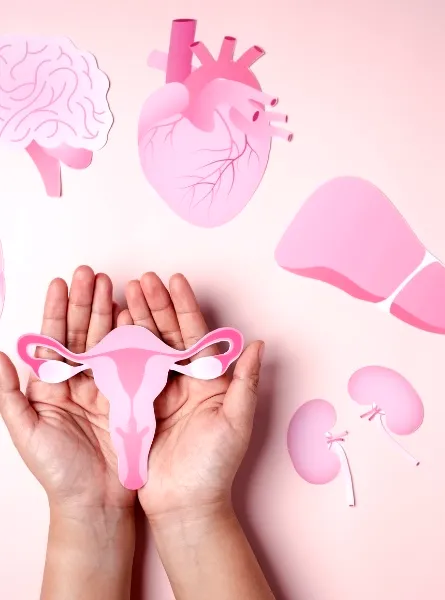
Did you know that women gain an average of 2-5 pounds during perimenopause and 50% of women report gaining more than 10 pounds?
Of course, everybody is different, so don't be worried if you gain more or less than the average. It's also normal for your weight to fluctuate a little bit, so if your scales keep showing you slightly different numbers don't chuck them out straight away!
For a lot of women, gaining weight is the most dreaded part of menopause. Luckily there are ways you can keep the pounds off and we've got all the tips you need to help.
Find out more about how to promote menopause weight loss rather than weight gain and keep your figure in this guide.
What Causes Weight Gain During Menopause?
The menopause hormones and reduction in estrogen plays havoc on women's bodies. From hot flushes to a loss of libido, there are tons of symptoms that you might experience. But, why does your body gain weight as your body goes through these hormonal changes?
The answer is all down to estrogen. As your body reduces the production of this hormone, your ability to burn calories is also reduced. Even when you're just sitting down, your body will be burning fewer calories than it was before menopause.
So, it's no surprise that a lot of women experience weight gain! If you go through menopause and don't make any dietary changes, it's almost inevitable. But, if you do adjust your diet with our tips, you could skip out on the extra pounds.
Watch Your Carbohydrate Intake
The best weight loss tip for menopause is to watch your calories. As you're likely to burn less now, reducing your intake slightly make sense. But, pay attention to that keyword slightly.
A lot of women think the best way to keep weight off is with a super low-calorie diet, but this is actually a very bad idea. This diet isn't sustainable and can mess up your metabolism, causing you to actually gain weight in the longterm. So, forget about ditching carbohydrates and instead focus on watching your portions.
Make sure you're eating enough carbs for your body, with just a little less than normal. Try to avoid going back for seconds if you don't need them, but if you're hungry then go for it. Listen to your body and don't do anything dramatic.
Eat Smarter Carbs
If you're looking into menopause weight management, it's actually better to look at what sources of carbohydrates you're eating rather than cutting them out altogether. Foods like fruit, vegetables, whole grains, and plain yogurt are all great carbohydrate sources that are full of essential vitamins and minerals. Cutting all of these out would be very unhealthy!
But, carbohydrate-rich foods that are lacking in nourishment, such as chips and cookies, shouldn't be prioritized. These are low-nutrient foods that your body can easily do without. Focus on eating well rather than how many carbohydrates you're eating for the best diet.
Eat More Protein
There are two reasons why eating protein is great for menopause. The first is that foods with a high-protein content tend to be very filling, which is great if you're looking to cut down on snacking! Opt for low-fat options such as chicken, lentils, and tofu to bulk out your meals.
The second reason is that it's natural as you get older and experience menopause hormones for your muscle mass to decrease. But, this probably isn't what you want if you're looking to keep your figure! By adding more protein to your diet you can help increase your muscle size and get more out of your exercise.
Avoid Snacking Too Much
Most people who have experienced PMS will know that your cravings for snacks go through the roof! This is exactly the same during menopause, and a lot of women find themselves reaching for more food between meals. While a little snack here and there might not feel like much, they soon add up and can lead to weight gain.
To avoid snacking, make sure you make filling, nutritious meals. If you think you still might be tempted, why not give away your unhealthy snacks to friends or food charities? Then, even if you do feel the urge to snack, you can only pick more natural healthy options such as fruits, veggies and nuts.
Ditch Fatty Meats
If you want to avoid gaining weight during menopause, it's a good idea to cut out or at least cut down on the amount of fatty meat you eat. Fatty meat is very high in calories and contains a lot of saturated fats, which aren't good for the body. But, there's another reason you might want to ditch these meats for a while.
During menopause, mood swings can be common. Fatty meats actually reduce the amount of serotonin in the body, which is one of the chemicals responsible for keeping you happy and calm, so eating lots of it can leave you feeling more angry, sad, and irritable! With your mood already very up and down, it's probably best to leave fatty meat out of your diet.
Instead, opt for low-fat alternatives such as chicken, lean ground beef, and turkey sausages. You could even consider a vegetarian or vegan diet to boost your health and help you through your hormonal changes.
Kick Start Your Menopause Weight Loss
If you don't want to gain a few extra pounds, learning about menopause weight loss techniques is essential. Your body is naturally going to put on weight, so you do need to actively fight it if you want to keep your figure. Just remember not to do any crazy, fad diets and keep up a healthy lifestyle, and you're off to a good start!
For more help, get in touch with our dieticians at EquipeNutrition. We have a team of experts trained to help you make the most out of your food and live a healthy, happy life for longer. For more about hormone-friendly diets, be sure to check out our article on 5 foods you should avoid during menopause.





